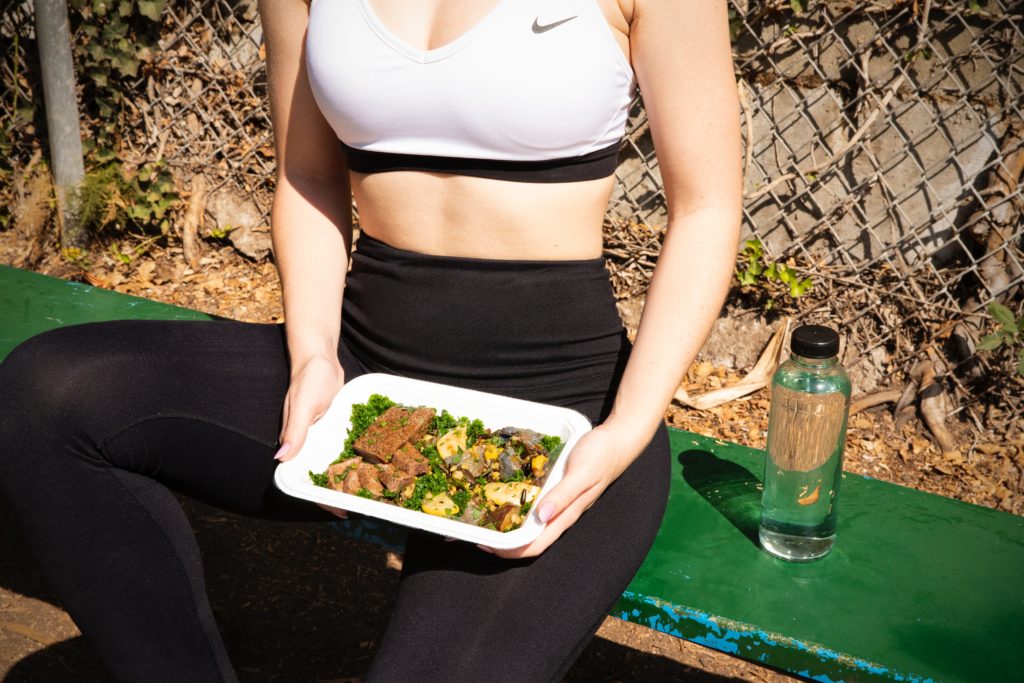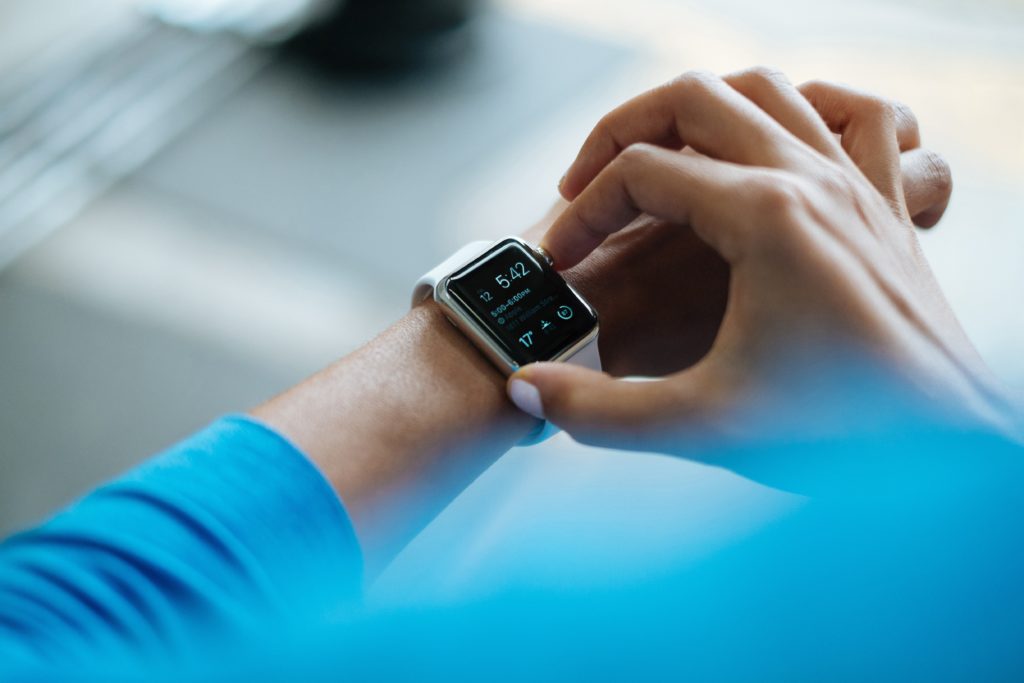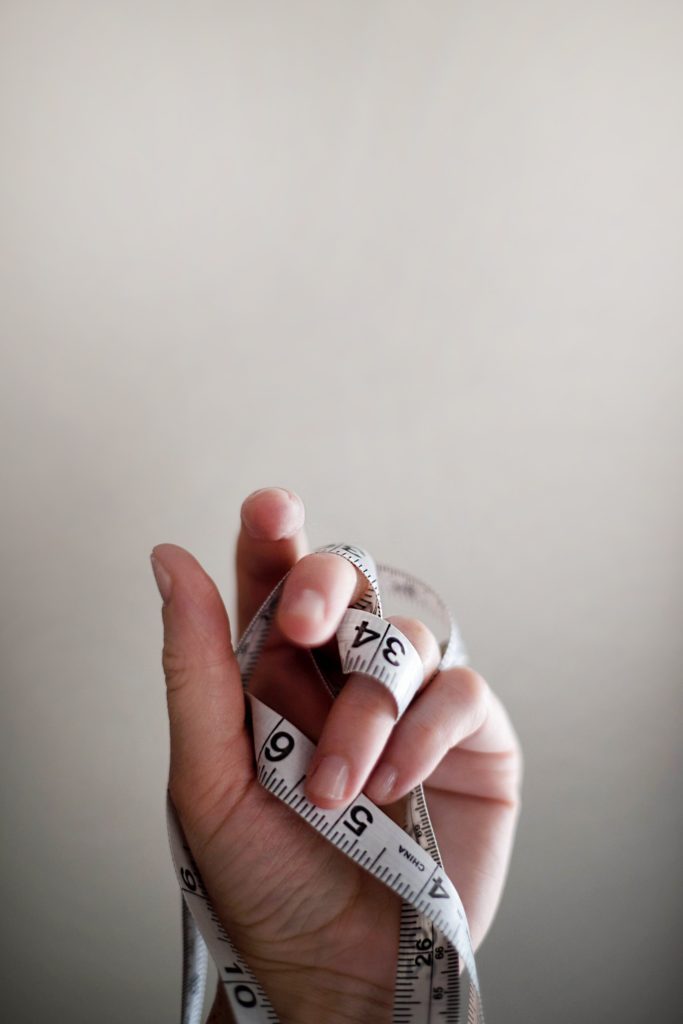Understanding Caloric Deficit

No bullshit. Here it is.
If you want to lose weight, you HAVE to consume less energy (food) than you burn. You must be in a caloric deficit.
Even if you’re eating “healthy” the quantity of consumption (portions) matters.
Shit – it’s literally the ONLY thing that matters.
ALL PORTIONS MATTER!
If you need to consume less than 1800 calories to lose weight and you’re consuming 1950 calories – even if they’re all from chicken, broccoli and egg whites GUESS WHAT?! You still won’t lose weight.
That’s the root of the frustration of 90% of my clients, “I’m eating healthy, bland, boring foods, cutting everything out, giving up everything I love and still can’t make progress.”
Can you relate? It’s awful.
Now Let’s Dig In (no pun intended).
Step 1: Set Your Deficit
To understand YOUR caloric deficit, you have to do a little grunt work.
Your caloric deficit is unique to you. So many people (mostly women) assume that a 1200 calorie diet is the key to success. But it’s probably not! Instead of following an arbitrary plan, develop a STRATEGY.
The formula in THIS post will give you YOUR caloric range for the deficit (or maintenance or gain).
While this approach is customized to any individual, it isn’t perfect! It only takes into account your body weight, which is not always an accurate predictor of your total energy needs. That being said, I think it’s a good start based on my personal experience, the experience I’ve seen with my clients, and many studies. Like this one. And this one!
When you’re setting your deficit don’t worry about your activity level.*
Step 2: Consuming Within Your Deficit
Very few people can intuitively stay within their deficit without counting or tracking calories. Is this the ONLY way to live your life while on a fitness journey? No. But it’s efficient, effective, and proven.
In my opinion, there really isn’t any way around it; you have to monitor calories.
I know that can be triggering, time-consuming, or overwhelming. However, I encourage those I communicate with to change their mindset about this practice. It’s not a means to an end or expected to be torturous. It’s an EDUCATION. Counting calories isn’t about restriction.
My deficit maxes out at 1685 calories and you better believe I consume every last one. I don’t feel deprived and I “spend” my “budget” in a way that keeps me full and satisfied. YES, that includes some concessions with treats and alcohol, but that’s what I’m willing to do to achieve the body of MY goals – mine. No one else.
It’s not about restriction! It’s about understanding your consumption, identifying portions and setting yourself up for success. Knowing the nutritional makeup of foods, caloric density, and what your body NEEDS versus temporarily WANTS is a very powerful skill set with LIFE LONG value.
How do you do it?
You can read nutrition labels, but labels lie. Read a case study here.
Your best bet for ACCURATE consumption is to use a food scale. Measuring your food via cup, tablespoon, teaspoon, etc. (volume) does not necessarily correlate with the information on a food label. Measuring your food via ounce, gram, fluid ounce, etc (weight) is 100% accurate every. Single. Time.
Step 3: Implement Your Deficit
Buy a food scale. Go to Bed Bath and Beyond. DON’T FORGET YOUR COUPON. Prep your meals and KNOW with certainty what you’re putting into your mouth.
Count and track everything. Bites. Licks. Tastes. Oil. Condiments. Cooking spray. Coffee Creamer. Everything you consume has an impact on your bottom line…or in this case…your waistline.
IT BEARS REPEATING: This method may seem like triggering behavior. But with the proper attitude, it may not. If you feel that triggered or feel that obsessive behaviors or disordered eating are inevitable, this is not for you, and I would encourage you to seek professional service. Did I mention I am NOT a doctor, nutritionist or dietitian? Yah. I’m not, okey?
I’ve been tracking and counting for YEARS, and instead of being consumed with numbers, I am empowered. I can look at anything and estimate (pretty damn accurately) its weight. It helps me keep my eyes in check when they’re bigger than my stomach and be MINDFUL about my eating patterns which are very importante.
Calories can be tracked via a number of different apps. My Macros, My Fitness Pal, or my personal favorite, Lose it, to name a few. Not only can you add foods, but you can import recipes, or manually input ingredients too! Be mindful of what you upload, there is an option to upload your own foods and those independently added items join the OVERALL DATABASE. You can always double check nutrition content here.
Step 4: Understand Factors of Success
- Larger deficits create a higher rate of fat loss. But they also have a lower rate of adherence. If you can’t adhere to your program, you won’t realize success.
- Consistency and patience are CRUCIAL because changing your body takes years. In some cases, a 10% deficit can yield a 0.8 pounds of fat loss per week.
- It’s harder to train and recover if your deficit is too low. In this case, the scale may be down, but you could be unhappy with your physique due to muscle loss. Muscles needs calories (mainly, protein) to grow, so your weight/fat loss will most likely NOT be linear. You’ll have to experiment with your caloric balance to achieve…well…balance!
- When you cut calories, you burn fewer calories for a variety of reasons, one of them being you move less due to less energy – per the bullet above. Train SMARTER, not harder to maximize your energy expenditure. READ: LIFT.
- Your dream body may not be your dream weight in pounds on a scale. Keep an open mind.
- What you do MOST of the time matters more than what you do some of the time. That being said, if you’re cutting calories, you can still go out, socialize, and have a life. ONE meal isn’t going to make or break you. A lot of meals will tho, so pick and choose when you indulge. There is no way to 100% accurately track a meal you did not prepare. Use your best judgement to either estimate (most people will under report, just saying), or say FAHK IT. Enjoy your meal, and then for your NEXT meal get right back to tracking. Read this post here on why you should eliminate your cheat meals.
How to Troubleshoot
If you are brand new to the world of caloric cutting the formula above may be all you need to realize change. If you’ve been around the block, or feel like you’re in a plateau, you may want to decrease your deficit by 10-15%. As you lose weight, you’ll have to re-evaluate your deficit.
If you’re having trouble recovering from or executing your workouts you may want to consider cycling carbs or calories based on your heaviest training days. IF you add to your balance one day – you MUST subtract the same amount from another day. Your body doesn’t RESET every 24 hours. It compounds, you know?
This is ALWAYS a work in progress. Your timeline isn’t 30-days. 8-weeks. Or one year. IT’S YOUR LIFE. There are no shortcuts. There is no supplement, pill, tea, or detox.
You cannot program hop; you cannot change your method every four weeks, you have to give your body the opportunity to work. It can take months, years, and more. Find professionals you TRUST to guide you, and not only will you see results, you’ll enjoy the ride.







Love the post Kate! Which scale is your favorite?
Try this one! https://www.amazon.com/dp/B01E6RE3A0?ascsubtag=.MjgwMzM0LTc3OQ.5cf00111-1b90-11e9-805c-51d79d99ce45&tag=rewardstyle-20
Dumb q but…. I don’t include calories burned in a workout as part of my daily allowance right? I.e. if I burn 400 cals in a workout that doesn’t mean my allowance is 1900cals vs. 1500 cals (weight x 10). Tysm!!!!
A caloric deficit is any shortage in the amount of calories consumed relative to the amount of calories required for maintenance of current body weight . This article will tell how you can achieve the calorie deficit by using Unified Food Powder and lose weight sustainably and healthily.
calorie deficit
I have been stuck in a plateau for about a year now and it is soooo frustrating! I work out 6 days a week and watch what I eat but nothing works. I did some research that suggested doing a caloric deficit to help lose more fat, but then I also read another article that says its horrible and to stop doing it, https://www.ez.insure/landing/2020/08/fitness-habit-you-have-to-stop-immediately/ .What are your thoughts on it? I mean I think I should give it a try since nothing else is working and I am staying at the same weight now for so long.
You can achieve a caloric deficit in a variety of ways – but a deficit itself is the only way to lose body fat!